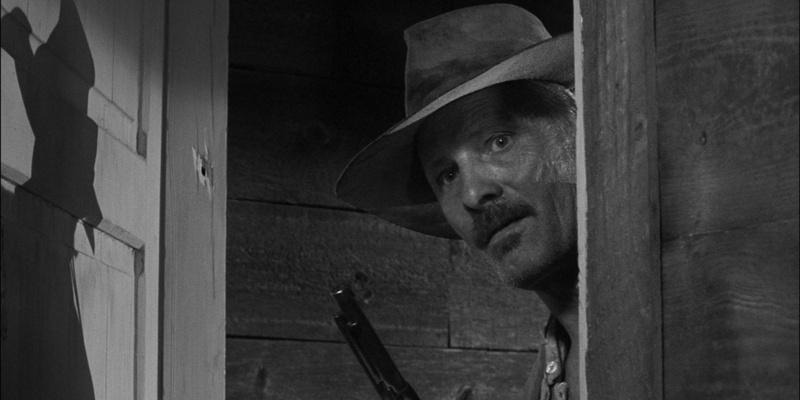
Review by
Benjamin Poole
Directed by: Lisandro Alonso
Starring: Viggo Mortensen, Chiara Mastroianni, Sadie Lapointe, Alaina Clifford, José María Yazpik, Viilbjørk Malling Agger
In an attempt to reconcile the psychotropic majesty of this film, spoilers
follow...
(To be brief, ignore people saying it's really slow and long - it's not,
and big deal: what else have you got on in Feb? - Eureka is
an entertaining and intriguing treatise on the nature of narrative and the
framing of history. Spare some space/time for it).
That Viggo Mortenson makes for a good cowboy. That dangerously
handsome face and pinched physicality, along with the chill green eyes
which could essay either reluctant kindness or complete cruelty: hi-ho
silver fox. No wonder then, from Young Guns II to his own
auteur effort, The Dead Don't Hurt, that he's played so many, and here he is donning the Stetson and
affecting brusque acts of violence once again in Eureka, Lisandro Alonso's (co-written with Fabian Casas and
Martín Caamaño) abstract meditation on the history of indigenous
people in America and beyond.

In an academy ratio of silvered monochrome, we follow Viggo (as "Murphy" -
a proper cowboy name) as he tracks down his kidnapped daughter (a proper
cowboy mission). You want to get into it; Viggo Viggos, the framing has a
stately vision, and the violence is the brutal bang/dead/fall of Saturday
Westerns, yet nastier. Problem is, it all feels a bit off: the crumpled
drunk outside the saloon posed just so, the HD sheen of the photography...
I tell you what it feels like, it feels like when a syndicated American TV
show does a Western episode. You know like Quantum Leap or
Spectre of the Gun. And that's because... it is! As the story climaxes in a Mexican
stand-off (less to do with guns than deeply felt emotional ties - an
Italian stand-off?) we cut to what we are watching being watched on a
television within a scene which we are now watching: 3.10 to Meta!
Within this new diegesis, we meet Native American women Alaina (Alaina Clifford), who had Viggo's film on in the background, and Sadie (Sadie Lapointe), who live in contemporary South Dakota with its various attendant
difficulties. Alaina is police, and her night shift involves looking for a
missing girl, arresting a knife toting teen and dealing with dangerous
driving, all within the grim context of societal drug dependency and
alcoholism. While Eureka's first section was tight and claustrophobic, here the screen opens wide
to take in the thick black and smeared lights of a menacing night on
patrol. Violence abides, and the film becomes suffused with dread: the
15-year-old back seat arrestee is pregnant and difficult, and when Alaina
calls dispatch for backup for a highway driver so drunk he doesn't even
clock that he's being arrested, she is effectively abandoned and left to
balance the potentially precarious situation by herself (this portion is
one of my favourite things I've seen all year - in response to the
artificiality of the opening, this second part is convincing and
riveting).

As dawn breaks, Sadie's story then takes centre stage: we witness her
coach reservation kids to shoot hoops, visit her brother in the pen and
see to her recently bereaved Grandfather. The sheer kindness which is
exuded by Sadie, her gentle voice and open, beautiful face supercharges
the film. As far as I can tell, this is Lapointe's first acting role and
her magnetic presence is incredible, so much so, and with such a
significant share of the film devoted to her "non-causal" scenes, I think
that the pointed warmth (a juxtaposition to the otherwise commonplace
violence) of her character is somehow key to whatever the intrinsic
meaning of Eureka may be.
I'm being tentative because Eureka suggests philosophy and
thematic objective but stops crucially short of supplying absolutes. With
the first two parts of the plot triptych, we are deliberately invited to
draw parallels via a hyperreal white mandated version of the west, a
neo-western rooted in social realism, wherein archetypal characters are
both ostensibly questing for a missing kid. Furthermore, both fragments
specifically set up narrative disequilibriums and cut (again wilfully)
before satisfying with closure. And then, as if we haven't learned from
the bravura TV show trickery of the opening, in Eureka's third part the pursuit of drawing conclusions from perceived plot
correlations falls down the back of the space time continuum, wherein we
go back to the 1970s with a group of Brazilian workers who live in the
rainforest. Iconography of knives and violence, and themes of displacement
occur within this segment too, but is that just our story-trained minds
imposing meaning where there, perhaps, is none to be found?

Incontestably, the film opens with a character on a mission of death and
ends with a counterpart rushing against time to save his life. Alonso
plays upon our established expectations of plot and, in a macro
suggestion, existence itself: time is a concept created by man, a
character declares, while Sadie's grandfather wonders where he is from
"every single day." In real life, psychedelic wonderings of this ilk are
commonplace and jejune, but within the challenging context of Eureka's
spiralling narratives, kaleidoscopic visual sets and obscured sense of
purpose, such notions become urgent and deliciously disquieting.

Eureka is on UK/ROI VOD now.

